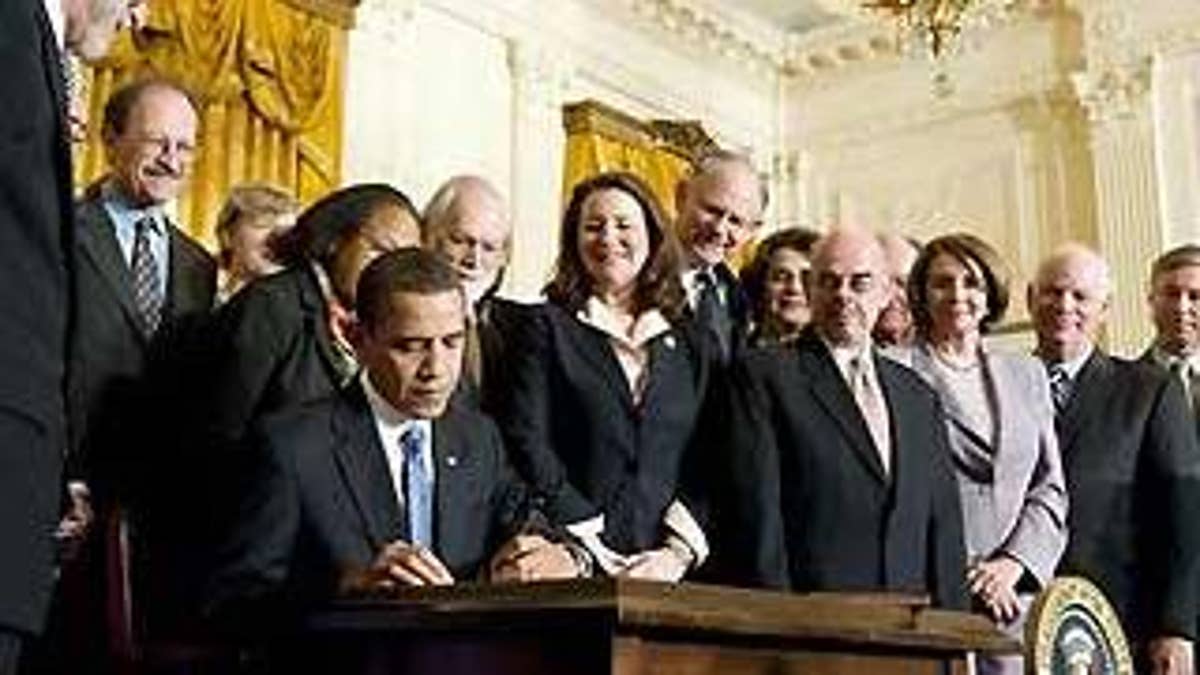
President Obama on Monday signed an order to lift restrictions on federal funding for embryonic stem cell research, a move he said rejects the "false choice" between science and morality.
The order would not fund the creation of new stem cell lines, but would allow federally funded scientists to conduct research on existing embryonic stem cells that under the Bush administration were off limits.
Obama said the full promise of such research "remains unknown" but that it should be explored because of the potential for scientists to find better treatments for ailments ranging from diabetes to Parkinson's disease to cancer.
"That potential will not reveal itself on its own. Medical miracles do not happen simply by accident. They result from painstaking and costly research," Obama said.
He warned of the risks of falling behind other countries in scientific research by keeping in place government restrictions on funding.
"When government fails to make these investments, opportunities are missed. Promising avenues go unexplored. Some of our best scientists leave for other countries that will sponsor their work. And those countries may surge ahead of ours in the advances that transform our lives," Obama said. "But in recent years, when it comes to stem cell research, rather than furthering discovery, our government has forced what I believe is a false choice between sound science and moral values. In this case, I believe the two are not inconsistent."
Obama cited broad bipartisan support for the order, and also issued a memorandum declaring his administration would base its policies on sound science and not political considerations.
The executive order fulfills a campaign promise, and supporters say it will open up a broad front of research.
But the issue remains controversial since days-old embryos must be destroyed to obtain the cells.
Opponents argue that research using embryonic cells is morally wrong.
House Minority Leader John Boehner issued a written immediately after the signing accusing Obama of contradicting his pledge to be "president for all Americans."
"The president has rolled back important protections for innocent life, further dividing our nation at a time when we need greater unity to tackle the challenges before us," Boehner said, adding that he fully supports research on non-embryonic stem cells.
"Non-embryonic stem cell research is not only showing great promise in the laboratory, but its applications are already being used to treat scores of diseases and medical conditions. Indeed, science and respect for human life can coexist," he said. "Politicians in Washington would be well-served to recognize this fact before they ask taxpayers to subsidize the destruction of innocent human life simply to advance a particular agenda."
Embryonic stem cells are master cells that can morph into any cell of the body. Scientists hope to harness them so they can create replacement tissues to treat a variety of diseases.
"I believe it is unethical to use human life, even young embryonic life, to advance science," said Tony Perkins, president of the Family Research Council, a conservative organization.
Obama plans to use the executive order and accompanying memo to signal his commitment to shift government's priorities. But he said Monday that the government will not open the door for human cloning, calling such action "dangerous" and "profoundly wrong."
Former President George W. Bush was the first president to authorize any federal support for embryonic stem cell research but limited it to 78 known stem cell lines -- lines that were created before Aug. 9, 2001. Federal research dollars could not flow to any research on embryonic stem cell lines derived after that deadline, and some scientists objected that the Bush policy left them with too few stem cell lines to research, and that only 16 of the original 78 were even suitable.
Hundreds more of such lines -- groups of cells that can continue to propagate in lab dishes -- have been created since then. Scientists say those newer lines are healthier and better suited to creating treatments for diseases. The Obama order will give researchers access to lines derived after Aug. 9, 2001.
The proposed changes do not fund creation of new lines, nor specify which existing lines can be used. They mean that scientists, who until now relied on private donations to work with these newer stem cell lines, can apply for government money for the research, just like they do for studies of gene therapy or other treatment approaches.
Dr. Curt Civin, whose research allowed scientists to isolate stem cells and who now serves as the founding director of the University of Maryland Center for Stem Cell Biology and Regenerative Medicine, disagrees with those who say embryonic stem cell research is morally wrong.
"This was already life that was going to be destroyed," he said. "The choice is throw them away or use them for research."
The Associated Press contributed to this report.












































